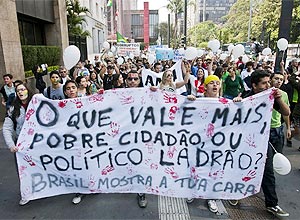 ‘What is worth more a poor citizen or a thieving politician?’ reads the banner at the march
‘What is worth more a poor citizen or a thieving politician?’ reads the banner at the march
BRAZILIANS PROTEST AT WIDESPREAD CORRUPTION
by Jan Rocha, LAB
São Paulo, September 12, 2011
While President Dilma Rousseff took the salute at the traditional military parade to celebrate Independence Day on 7th September, on the other side of Brasilia’s main avenue 30,000 demonstrators were marching to protest at the many scandals of fraud and corruption recently revealed, involving federal ministers, local governments and congress.
Phantom projects and non-existent public employees, roads and bridges that are never built, funds diverted from education and health to the projects of political allies, the use of public funds to pay for motels, private planes and trips overseas. Perhaps the most outrageous of all was the discovery that a number of first ladies in poor municipalities in Alagoas had diverted money destined for school meals to buy luxury goods. Instead of protein-enriched meals for the poorest children, the funds were buying whisky and perfume for the mayors’ wives.
Congress rebels
The trigger for the protests, which were repeated in other cities, was the decision of the national congress not to expel one of their members, federal deputy Jacqueline Roriz, for unethical behaviour, even though she had been secretly filmed accepting packets of money in exchange for favours from the government of Brasilia, for many years the fiefdom of her father, Joaquim Roriz. It seems that the deputies were being pragmatic: with so many of them also potentially facing corruption charges, they thought it wiser not to create a precedent.
This case came after months of accusations against various members of President Dilma’s government. In the nine months since she became Brazil’s first woman president, she has lost five ministers from her multi-party coalition government, four because of corruption scandals. Much of Dilma’s huge support – the last opinion poll gave her 80% — comes from the public perception that she is a president prepared to sack corrupt ministers.
Dilma’s bulldozer style
The exodus of ministers has also highlighted the differences between the president and her predecessor, Luiz Inácio Lula da Silva. Lula, honed by years as a trade union negotiator, was a skilled conciliator who avoided confrontation and bent over backwards not to offend anyone. Dilma, who before winning the presidency had not been a politician or stood for election, favours the bulldozer style — brusque and direct. For Brazilian politicians accustomed to being wooed and indulged through years of coalition governments, this is uncomfortable new territory.
Antonio Palocci, her chief political minister and enforcer, was forced to resign after it was discovered that he had acquired a vast fortune accumulated in recent years as a consultant trading on his influence as an ex-minister in Lula’s government.
Dilma sacked transport minister Alfredo Nascimento, inherited from Lula’s government, because the evidence of corrupt practices in his ministry was just too overwhelming. Agriculture minister Wagner Rossi, another hangover from Lula’s government, resigned after a whistle blower denounced corruption in his ministry. And Pedro Novais resigned on 14 September, after press reports that he had used public money for personal ends.
Defence minister Nelson Jobim did not go because of corruption, but because of differences, not only with Dilma herself but also, according to a leaked letter from retired general Luis Gonzaga Lessa, with most of the armed forces under his command. This allowed the president to appoint Lula’s former foreign minister Celso Amorim, whose nationalist stance is more attuned to her foreign policy than that of the pro-American Jobim. .
The press also presented scathing accusations of the misuse of public funds to favour family and allies against the minister for cities, another federal deputy indicated by allied coalition parties. However, he is still in the government, for the moment, at least.
Dilma’s dilemma
But it seems that to lose five ministers in nine months was considered a bit too much. Dilma has to keep her coalition parties on board, especially the numerically powerful PMDB, which has 79 members of Congress. Theoretically, she has a huge majority in Congress with only 96 out of the total of 513 members belonging to parties that have openly declared themselves in opposition. But the coalition is an unruly mass of interests, not united by any ideology, but driven by the need to extract funds from the government for pet projects that will ensure re-election.
So while members of Congress have expressed indignation about losing ministers indicated by their party, none of them has expressed regret for the corruption of which the ministers were accused. The only solidarity came from the Senate, where veteran PMDM senators Pedro Simon and Jarbas Vasconcelos tried to launch an all party anti-corruption front. Few turned out to support them.
 On the street however, outrage is running high. More demonstrations are planned. Anthropologist Roberto Da Matta attributed the indignation to the perception that although Brazil is improving, corruption remains. “Governments come and go, rightwing, centrist, leftwing, Lula, now Dilma, and everything continues the same.”
On the street however, outrage is running high. More demonstrations are planned. Anthropologist Roberto Da Matta attributed the indignation to the perception that although Brazil is improving, corruption remains. “Governments come and go, rightwing, centrist, leftwing, Lula, now Dilma, and everything continues the same.”
Dilma’s dilemma is that however keen she may be to clean up politics she presides over a coalition government, and she needs the support of her allies to get anything through congress. Somehow she has to conciliate these conflicting demands. For the moment she has the support of the streets, but if corruption is seen to remain rampant, how long will this last?
